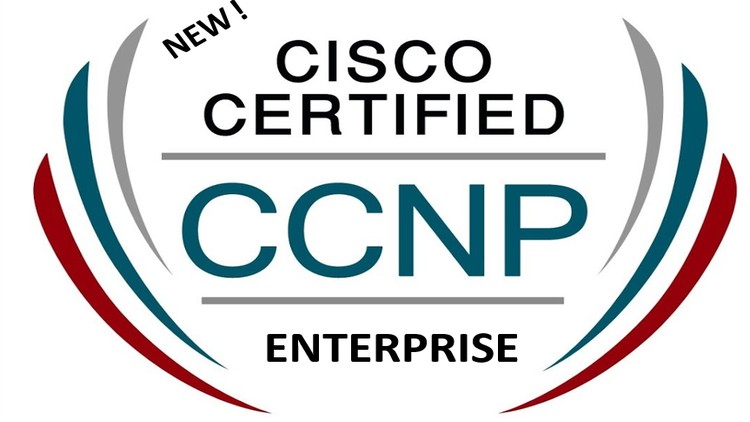Implementing Cisco Enterprise Network Core Technologies Certification Prep Training Courses Classes
Why Choose Us | Implementing Cisco Enterprise Network Core Technologies Employment Objective
- Description
- Schedule
- What You'll Learn
- Outline
- Prerequisites
- Income Expectations
- Next Step
- Tuition Fee
- Exam
Implementing Cisco Enterprise Network Core Technologies Certification Prep Training Courses Classes
Implementing Cisco Enterprise Network Core Technologies v1.0 (ENCOR 350-401) is a 120-minute exam associated with the CCNP and CCIE Enterprise Certifications. This exam tests a candidate's knowledge of implementing core enterprise network technologies including dual stack (IPv4 and IPv6) architecture, virtualization, infrastructure, network assurance, security and automation. The course, Implementing Cisco Enterprise Network Core Technologies, helps candidates to prepare for this exam.
The following topics are general guidelines for the content likely to be included on the exam. However, other related topics may also appear on any specific delivery of the exam. To better reflect the contents of the exam and for clarity purposes, the guidelines below may change at any time without notice.
SCHEDULE DATES - 40 Hour Program
ENCOR 350-401
9AM - 5PM (Weekdays)
Start Date & Graduation Date
04/04/2022 to 04/08/2022
5 Days (40 Hours) a Week for 1 Week
|
||||
ENCOR 350-401
9AM - 5PM (Weekdays)
Start Date & Graduation Date
05/16/2022 to 05/20/2022
5 Days (40 Hours) a Week for 1 Week
|
||||
ENCOR 350-401
9AM - 5PM (Weekdays)
Start Date & Graduation Date
07/18/2022 to 07/22/2022
5 Days (40 Hours) a Week for 1 Week
|
||||
ENCOR 350-401
9AM - 5PM (Weekdays) |
Start Date
Graduation Date |
04/04/2022
04/08/2022 |
5 Days (40 Hours) a Week for 1 Week | |
ENCOR 350-401
9AM - 5PM (Weekdays) |
Start Date
Graduation Date |
05/16/2022
05/20/2022 |
5 Days (40 Hours) a Week for 1 Week | |
ENCOR 350-401
9AM - 5PM (Weekdays) |
Start Date
Graduation Date |
07/18/2022
07/22/2022 |
5 Days (40 Hours) a Week for 1 Week | |
Implementing Cisco Enterprise Network Core Technologies Certification Objective
Architecture
Virtualization
Infrastructure
Network Assurance
Security
Automation
Implementing Cisco Enterprise Network Core Technologies Certification Prep Training Courses Classes
Architecture
Explain the different design principles used in an enterprise network
- Enterprise network design such as Tier 2, Tier 3, and Fabric Capacity planning
- High availability techniques such as redundancy, FHRP, and SSO
Analyze design principles of a WLAN deployment
- Wireless deployment models (centralized, distributed, controller-less, controller based, cloud, remote branch)
- Location services in a WLAN design
Differentiate between on-premises and cloud infrastructure deployments
Explain the working principles of the Cisco SD-WAN solution
- SD-WAN control and data planes elements
- Traditional WAN and SD-WAN solutions
Explain the working principles of the Cisco SD-Access solution
- SD-Access control and data planes elements
- Traditional campus interoperating with SD-Access
Describe concepts of wired and wireless QoS
- QoS components
- QoS policy
Differentiate hardware and software switching mechanisms
- Process and CEF
- MAC address table and TCAM
- FIB vs. RIB
Virtualization
Describe device virtualization technologies
- Hypervisor type 1 and 2
- Virtual machine
- Virtual switching
Configure and verify data path virtualization technologies
- VRF
- GRE and IPsec tunneling
Describe network virtualization concepts
- LISP
- VXLAN
Infrastructure
Layer 2
- Troubleshoot static and dynamic 802.1q trunking protocols
- Troubleshoot static and dynamic EtherChannels
- Configure and verify common Spanning Tree Protocols (RSTP and MST)
Layer 3
- Compare routing concepts of EIGRP and OSPF (advanced distance vector vs. linked state, load balancing, path selection, path operations, metrics)
- Configure and verify simple OSPF environments, including multiple normal areas, summarization, and filtering (neighbor adjacency, point-to-point and broadcast network types, and passive interface)
- Configure and verify eBGP between directly connected neighbors (best path selection algorithm and neighbor relationships)
Wireless
- Describe Layer 1 concepts, such as RF power, RSSI, SNR, interference noise, band and channels, and wireless client devices capabilities
- Describe AP modes and antenna types
- Describe access point discovery and join process (discovery algorithms, WLC selection process)
- Describe the main principles and use cases for Layer 2 and Layer 3 roaming
- Troubleshoot WLAN configuration and wireless client connectivity issues
IP Services
- Describe Network Time Protocol (NTP)
- Configure and verify NAT/PAT
- Configure first hop redundancy protocols, such as HSRP and VRRP
- Describe multicast protocols, such as PIM and IGMP v2/v3
Network Assurance
Diagnose network problems using tools such as debugs, conditional debugs, trace route, ping, SNMP, and syslog
Configure and verify device monitoring using syslog for remote logging
Configure and verify NetFlow and Flexible NetFlow
Configure and verify SPAN/RSPAN/ERSPAN
Configure and verify IPSLA
Describe Cisco DNA Center workflows to apply network configuration, monitoring, and management
Configure and verify NETCONF and RESTCONF
Security
Configure and verify device access control
- Lines and password protection
- Authentication and authorization using AAA
Configure and verify infrastructure security features
- ACLs
- CoPP
Describe REST API security
Configure and verify wireless security features
- EAP
- WebAuth
- PSK
Describe the components of network security design
- Threat defense
- Endpoint security
- Next-generation firewall
- TrustSec, MACsec
- Network access control with 802.1X, MAB, and WebAuth
Automation
Interpret basic Python components and scripts
Construct valid JSON encoded file
Describe the high-level principles and benefits of a data modeling language, such as YANG
Describe APIs for Cisco DNA Center and vManage
Interpret REST API response codes and results in payload using Cisco DNA Center and RESTCONF
Construct EEM applet to automate configuration, troubleshooting, or data collection
Compare agent vs. agentless orchestration tools, such as Chef, Puppet, Ansible, and SaltStack
Implementing Cisco Enterprise Network Core Technologies Prep Training Courses Classes Program
- This course is designed for individuals who have basic computer user skills and who are interested in obtaining a job as an entry-level IT technician.
- HS Diploma/GED
Implementing Cisco Enterprise Network Core Technologies Certification Prep
Income Expectation
$65,322/yr
The average salary for a Implementing Cisco Enterprise Network Core Technologies Certified Employee is $65,322 in New York City. Salary estimates are provided by CISCO.
Upon completion of this course, and the certifying exam(s), the student will be qualified to take a job as a
Implementing Cisco Enterprise Network Core Technologies Certification
Implementing Cisco Enterprise Network Core Technologies Certification Prep Training Courses Classes
CCNP Collaboration
CCNP DATA Center
CCNP Service Provider
CCNP Enterprise
Implementing Cisco Enterprise Network Core Technologies Certification Prep Training Courses Classes
$2,500
Implementing Cisco Enterprise Network Core Technologies Certification Prep Training Courses Classes
Implementing Cisco Enterprise Network Core Technologies v1.0 (ENCOR 350-401) is a 120-minute exam associated with the CCNP and CCIE Enterprise Certifications.

